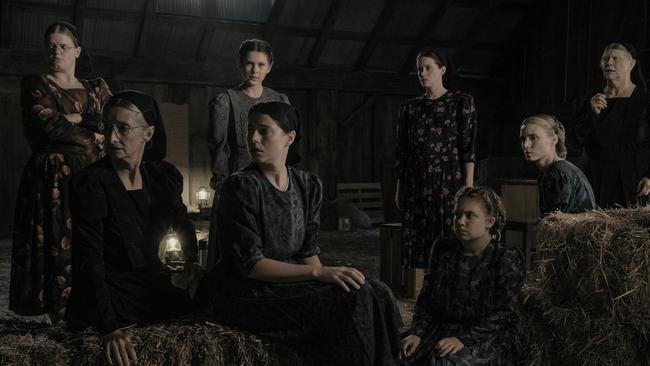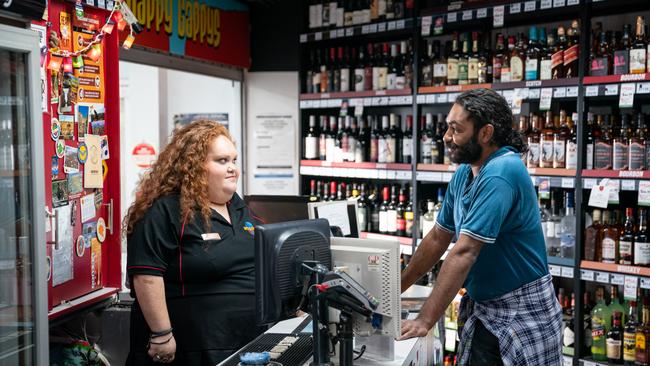Women Talking a ‘tough-minded yet sensitive film’
A group of women decide what to do about the men who abused them. They are faced with three choices: to do nothing, to leave their Mennonite colony or to stay and fight for their rights.

Women Talking (M)
In cinemas
★★★★
Women Talking, the fourth feature made by Toronto-born Sarah Polley, is one of the 10 movies nominated for the Best Film Oscar this year. An actor turned director, Polley made as her debut feature the achingly moving Away from Her (2006), in which Julie Christie played a woman suffering from Alzheimer’s. Polley followed that success with Take This Waltz (2011), about an extramarital affair, and, in 2012, the highly original Stories We Tell, which explored the nature of truth.
We’ve had to wait a decade for Polley to return with a new feature, but it was worth the wait. Her latest film is a powerful adaptation of Canadian author Miriam Toews’s 2019 novel which was inspired by shocking crimes that occurred at a Mennonite colony in Bolivia.
Mercifully, the crimes themselves are not depicted – we only hear about them. Some of the men who controlled the colony had drugged some of the woman and raped them while they slept. A number of them became pregnant as a result.
When the film takes place, one of the younger women, Mariche (Jessie Buckley) has attacked the men with a scythe; the police have been called but their role is not so much to investigate the charges of rape as to protect the men from the women.
In any event, when the film commences there is temporarily only one man left in the colony, leaving the women to discuss what to do next. They are faced with three choices: to do nothing, to leave the colony or to stay and fight for their rights. To begin with they decide to hold a vote on the matter, at which the first option, to do nothing, is rejected. The question now is whether to stay or to fight?
The film, which is beautifully photographed by Luc Montpellier in colour so desaturated that it’s almost monochrome, mostly takes place in the hayloft where three generations of the women meet. Among the first to leave the meeting is Janz, played by Frances McDormand who, together with Brad Pitt, was one of the film’s producers. Despite her ominously scarred face, which suggests past atrocities committed against her, Janz is committed to not taking any action; to leave or to fight, she suggests, might prevent the women from ever entering heaven.
The remaining women, eight of them, discuss the pros and cons. They include Ona (Rooney Mara), an unmarried woman impregnated as a result of rape as well as a pair of older women, Agata (Judith Ivey) and Greta (Sheila McCarthy) and their daughters, Salome (Claire Foy) and Mejal (Michelle McLeod). These women have never been educated by the elders who control the colony and none of them can read or write, which is why they turn to the one man still around, August (Ben Wishaw), whose family had been members of the colony but had left. He has been to college and has returned partly to try to teach the children and partly (mainly perhaps) because he loves Ona. The women ask him to keep the minutes of their debate, but not to contribute to it otherwise.
If they are to leave (or “flee” as some prefer to describe it) who can they take with them? What about the boys? At what age does a boy become a threat to them and therefore should be left behind?
These and other matters are discussed at length but the film is so well written and acted that it never for a moment becomes dull – on the contrary this is thought-provoking, riveting material. These women are not talking only about their particular problems and challenges – their concerns have a far wider application. They have been denied a voice by the elders of the colony; now, at last, they are finding that voice.
Women Talking is a tough-minded yet sensitive film that could pose a bit of a challenge for some audiences. It’s a film with a universal message (it should be seen in Afghanistan or Saudi Arabia but won’t be) yet it’s not angry. There’s compassion here and, yes, there’s love.
-
We Are Still Here (M)
In cinemas
★★★
Selected to open last year’s Sydney Film Festival, We Are Still Here, a co-production between Australia and New Zealand, tells eight unconnected stories in the space of only an hour and a half. Each story involves in one way or another the clash between Indigenous people and the Europeans who colonised them.
Ten directors contributed to the film which is designed as a sobering reminder of the effect on First Nations people of the arrival of Captain James Cook 250 years ago. Indigenous New Zealanders and Pacific Islanders were impacted along with Indigenous Australians, and this very ambitious film aims to be inclusive as far as is possible in telling just a few of their stories.
The opening sequence, which is animated, is set in the distant past as a mother and daughter, fishing from a canoe, experience a terrifying vision of the future. This gets the film off to a powerfully cinematic start.
Subsequent stories, set in the 19th and 20th centuries, approach the theme in a variety of ways. In 1859, a white horseman, armed with a pistol, is lost in the outback when he is confronted by a group of Aborigines wielding spears; one of them offers to guide him. In 1864, the daughter of a Maori chief begs her father to confront the English invaders.
In 1915, in Gallipoli, a Samoan soldier fighting for the British finds himself temporarily alone in the trenches.
The remaining four stories take place in more recent times. In Auckland in 1981, during the protests against the Springboks tour, an Indigenous Australian is arrested along with Maori demonstrators. In Sydney, a girl who sprays graffiti on the walls of buildings forms a tentative relationship with a boy hired to paint them over. In Melbourne, close to Captain Cook’s cottage, an Indigenous mother and daughter are assaulted by a bunch of thugs wearing masks made of Australian flags. And in Alice Springs, the attempts of an Aboriginal man to buy some grog are thwarted by a white policeman.
The problem inherent in this kind of film is that the stories are frustratingly brief. Just as you become interested in one narrative you’re propelled into another. In this instance the problem is compounded because the stories, instead of unfolding separately, are intercut so that the whole thing becomes a bit of a jumble.
Individual contributions are fine, but for the most part so brief that they don’t register in the way that they should. In the end, the simplest story – the one set in Alice Springs – comes across most strongly, with lovely performances from Clarence Ryan as the man who wants to buy some grog and Megan Wilding as the shop assistant with whom he establishes a mildly flirtatious relationship.
But in the end, and despite the best of intentions and some interesting talents involved, We Are Still Here is a disappointment and less than the sum of its parts.





To join the conversation, please log in. Don't have an account? Register
Join the conversation, you are commenting as Logout